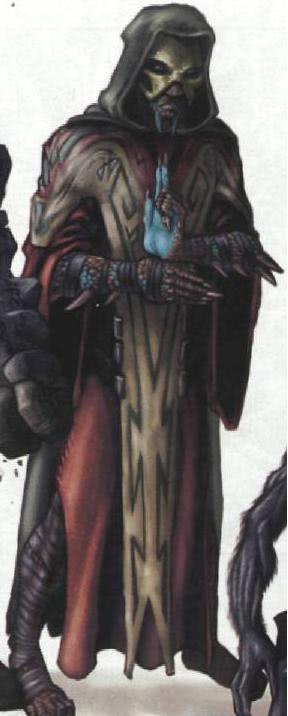T'kel
T'kels are one of four playable races for Dungeons & Dragons 3rd edition added in the article "Xenophilia", in Dragon Magazine issue #317.

Originally a race of barbaric hunter-gatherers who regularly warred with their neighbors and raided the others races, the reptilian t'kels have changed dramatically. Within the last century, they have shifted their culture from its former brutal nature to a more philosophy-centered agricultural society, one that believes in the importance of natural harmony and the need to live in balance with the world around them.
This drastic change was the work of a philosopher-king named Zuras, the first t'kel to change his ways. Decades ago, Zuras was hunting a cadre of elf rangers when he encountered a "nature spirit" - in reality an adu'ja. The mystical-seeming creature soothed Zuras and lured him into a conversation, debating with him over the flaws of t'kel culture. For a fortnight they sat together and talked, the adu'ja describing the ways of its own people and how they would benefit the t'kels far better. By the dawn of the fifteenth day, Zuras had been converted; he returned to his people and dedicated his life to "freeing them from the serpent's coils".
Though the t'kels have not yet tamed their innate ferocity, they have channeled it into less destructive endeavors. Modern t'kels live in shallow subterranean communities below verdant forests, which they tend to and carefully protect. They farm a wide variety of plants, producing medicines and exotic spices and incenses, which they trade with neighboring races.
The ferocity of the t'kels is still as much their defining trait as the philosophy they absorbed from the adu'ja. It is a side of themselves that they are ashamed of, and the number one cause of t'kels leaving their villages to become adventurers is shame over having given in to their savage nature during a fight; a self-imposed exile, to avoid injuring anyone else. The race practices traditions of martial arts and meditation, seeking to better channel and master their savage impulses. For this reason, monks have become the dominant caste within their society, as they combine elements of modern t'kel spirituality and primal t'kel warrior traditions through a lense of discipline and self-mastery.
Truthfully, t'kels have come to actually enjoy living as part of their environment. That's not to say they won't oblige someone who starts a fight, but the average t'kel sincerely does enjoy helping the wilderlands to thrive and practicing arts and crafts, rather than pillaging and plundering. T'kels have proven themselves to be excellent weavers, producing a material called "sh'ematta" that has brilliant colors and a soft texture. Still, they are caught in thatstrange place between the worlds of their savage ancestry and their new civilization; whilst they take pride in their culture, few are open-minded enough to take jibes about their base beginnings.
Physically, t'kels are reptillian humanoids, but far more evolved than the common lizardfolk. A t'kel looks more or less like a human, save for the cutting bone ridges they have in lieu of teeth and their clawed digits, but they are covered in beaded scales of tan to cocolate color. Their backs and bellies are are adorned in patterns of brilliant colors, ranging from aquamarine and indigo to burnt umber and saffron. Both sexes have pointed, more pronounced scales on their brows and jaws.
In a trait definitely inherited from their reptilian ancestry, female t'kels are the visually more impressive sex. They tower over their menfolk, reaching heights of 6'5" to 7'11" in comparison to their 4'9" to 5'11", but the dense muscles means males are actually as strong as their females.
One of their original cultural traits that they have retained is the importance of masks. T'kels believe their faces are a representation of their souls and their most secret desires; as such, they never allow others, or at least non-t'kels, to see them bare-faced. They sculpt incredibly beautiful masks of beaten metal, with shape, style and color identifying status and occupation amongst t'kel society; the rare the metal, the higher its wearers rank, whilst the color and pattern of paint applied denotes occupation.
T'kels have a subtle sense of humor, one which is difficult to draw out. They loath displays of waste or wanton destruction, and strive to pacify anything that they feel threatens the natural order - and whilst they shun their savage impulses, they are willing to employ lethal force. They are quite taken with the concept of honor, and unwilling to break oaths. They tend to be inquisitve about outside cultures, and t'kel adventurers often seek the wisdom of other races and relay it to their kin, which causes t'kel communities to slowly grow and change as they take on different aspects borrowed from other cultures. Though not especially intelligent, t'kels are cunning, and can surprise those who mistake them for dumb brutes.
- +2 Dexterity, -2 Intelligence
- Medium
- Monstrous Humanoid
- Base Land speed 30 feet
- Swim speed 20 feet; this means a t'kel gains a +8 racial bonus on Swim checks to perform special actions or avoid hazards, can always take 10 on a Swim check even if distracted/endangered, and can use the Run action whilst swimming in a straight line.
- Darkvision 60 feet
- Claws: 2 claw attacks that deal 1d4 + Str modifier damage.
- Favored Class: Monk, although Fighters and Rangers are also culturally common.